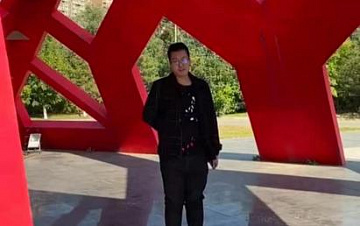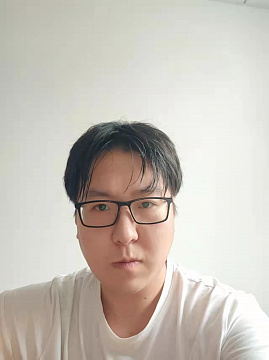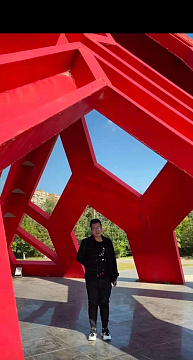I am glad that I was given the opportunity to participate in the academic mobility program, which gave me a glimpse into the real life of our students inside the country, if only for a short while. Tianjin University of Technology has many amazing teachers who excel in their professional fields. Their professionalism is evident both in the classroom and in extracurricular activities. At the same time, the biggest advantage of coming to Tianjin Institute of Technology is that I have made many friends who have also helped me a lot. Through socializing and sharing experiences with new friends, I learned a lot.
Main difficulties
It should be systematic course selection and final examination. Domestic college students in the new semester before all have "difficult elective, elective difficult, difficult on the sky!" So say, spell but hand speed, spell but network speed, choose a course to become a mine disaster, obviously want to choose basketball, finally forced to choose aerobics... The course selection system of Korean universities is only a few times a year, but every time it is painful for college students. University course selection server crashes, just like your mobile phone has no traffic, WiFi is not connected to the Internet, bad mood. Every time choose a class, class cadre just send a message, everyone is like fighting like, pick up their weapons in succession, which network speed is fast, with which. Some also go to Internet cafes to get online. It's not uncommon for the course selection server to crash. If it's a little bit better, it will be full as soon as it's refreshed. Especially when you choose sports, you must be fast, otherwise you will be finished and a man will have to practice yoga.
As an exchange student, I am not quite clear about the course selection system in China, so I will have corresponding teachers and classmates to help me sel ect courses. However, I think we should first choose the courses that are useful to our major. We should ask the teacher's time in advance and ask the students' introduction to each major before we choose.
On the other hand, it's the examination week. As an exchange student, I didn't choose many courses, so I didn't have much pressure in my study in Tianjin Institute of Technology, but I still learned a lot fr om the teaching system of Tianjin Institute of Technology. In TIANJIN Institute of Technology, there are not only midterm and final exams, but also a lot of reports and discussions. I would like to share my views on the learning test in the form of report. On the whole, this is a good form of examination, which allows students to understand the professional knowledge more deeply. Moreover, the report is often prepared by groups, which exercises the ability of unity and cooperation. This is also something we should learn from, but the education system is a slow learning and improvement, we still have to follow.
Visa process
Due to the epidemic, I was in China and does not need to apply for a visa.
Difficulties when I came to overseas institutions
I don't think there is any difficulty. Just pay attention to the communication with the school.
Cost of my overseas internship (visa fee Air ticket / travel, registration fee / tax / deposit to the internship location. If you have used it, please go to the reception institution, insurance policy / medical service Public transport, food, accommodation)
The cost of the train is 300 yuan, the accommodation is 1200 yuan. According to my calculations, about 2000 yuan per month is enough to live in Tianjin. If you don't have enough money, you can work on weekends and in your spare time.
At the University of Chemical Technology in Shenyang, I experienced the atmosphere of a Chinese university, as well as the enthusiasm of the lecturers and students.
I am impressed by this internship. It was useful for me. Thanks to this internship, I immersed myself in the atmosphere of a Chinese university, multiplied my knowledge and successfully passed all final exams at the end of the internship.
Difficulties during the preparation for the internship
There were no particular difficulties. The only difficulty for me was establishing relationships with the students at the new university.
Visa process
I don't quite understand how to get a chinese visa. To get a visa in Irkutsk, you have to go to the Consulate General of China and submit all the necessary documents.
Your suggestions for future academic mobility program participants
I think you can start to get to know the university locally by taking a walk around the area with your classmates. You can also ask them questions. The best way to adjust to a new environment is to make friends with local students. They know more and will be able to help you if you have any difficulties.
Your tips to reduce costs:
Transport costs are about 300 RMB (from Beijing to Shenyang).
Textbooks cost about 100 yuan.
Dormitory costs 1200 RMB (per year)
Water costs about 70 RMB per month.
Monthly expense: around 1500 RMB per month.
You can save money by eating less and shopping less.
The year 2020 is a very heavy year for the whole world, which is experiencing unprecedented disasters. Fortunately, my university, Irkutsk State Polytechnic University, offered me the opportunity to exchange my studies. Shenyang is a very cultural city, its historical significance is irreplaceable, Shenyang railway station is the Soviet Union to participate in the construction, is the product of Chinese and Russian culture.
When I came to Shenyang University of Chemical Technology for the first time, I felt the incomparable enthusiasm of shenyang people and experienced the different college life of Shenyang students. I feel very happy during my study and life in Shenyang University of Chemical Technology for several months. The teachers are responsible, the students are active, and the campus environment is beautiful.
Because of the epidemic, I cherish the campus life more and live every day fully. I hope the epidemic will end soon. Come on, China! Go Russia! Go world!
About teaching method at Host University
Each teacher has a different approach to teaching and it's interesting. Even if we don't understand something, they always tell us what to pay attention to when preparing for the final exams.
Campus and important locations
The campus is very good, the green is beautiful, there is also a stadium, gym, lake, grass, and more.
Some difficulties in the preparation stage of your internship
There were no difficulties, as both universities, Irkutsk National Research Technical University and Tianjin Polytechnic University, took a responsible approach to organising the internship. All we had to do was to fill in the necessary information. Teachers and classmates in Tianjin helped us to adapt and get into the learning process. Future participants of the academic mobility programme can be advised to listen to the teachers carefully, otherwise it might be difficult to pass the exams. Prepare well in advance before the exam, nobody can help you during the exam!
Cost of your overseas internship, your tips to reduce costs
Since I don't need a visa, I can't say how much it might cost. Transport costs were about 200 yuan, accommodation 1500-2000 yuan.
International business Wendy
I think it is a good opportunity for academic growth. I met a lot of friends and experienced an atmosphere different to that of foreign universities. The professors at Shenyang University of Chemical Technology helped me in everything and encouraged me to do new things.
Difficulties in the preparation stage of your internship? What advice and suggestions.
The biggest difficulty is the epidemic situation. Because of the epidemic situation, you need to prepare some accounting and testing, and there are no other difficulties.
Difficulties at a host foreign organization. Tips for solving them
As for this, there can only be some differences between professional courses and exchange schools. You should be prepared to learn and think about how to solve this problem. My suggestion is that since you are here, why not learn more, such as Mao Zedong theory and thought, which are not available in foreign countries. You should listen to it, Because if this is a necessary political course in China, it is also necessary for postgraduates.
Visa, registration fees / taxes / pledges in the host organization, medical insurance policy / medical services, travel by public transport, meals, accommodation
About this, you'd better prepare a Chinese insurance, and bring your ID card, student card and bank card. You need to buy bed sheets and quilts here. They are not provided here, and the annual accommodation fee is 1200 yuan. The cost of water and drinking water is about 100 yuan per person a semester. You also need to prepare the canteen card in advance, but you can pay through wechat when eating in the canteen, You must use the canteen card to take a bath. If you can, I suggest you go to the Shenyang Forbidden City, which is a good place.The monthly living cost is about eighteen thousand, which is the most here. If you are from the south, it is recommended to bring more clothes because it is very cold in winter here.













